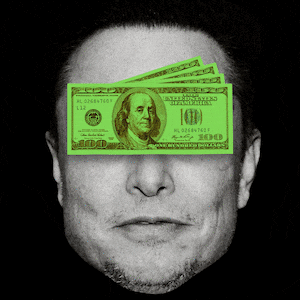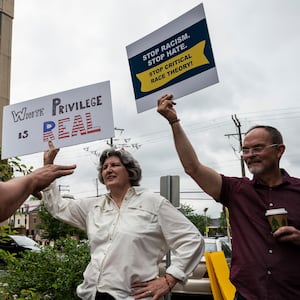Princeton University’s Board of Trustees has voted to fire humanities professor Joshua Katz, revoking his tenure, ostensibly over charges related to a sexual misconduct investigation. But Katz’s defenders say he’s the latest victim of “cancel culture,” punished for criticizing anti-racist initiatives on campus in a July 2020 essay for the online magazine Quillette.
The faculty member whose report led to the unusual move against the tenured professor says his conclusions were unrelated to Katz’s controversial statements. But is this simply spin? Or is there a legitimate case to be made that Katz is being hounded out of a job on trumped-up charges meant to punish him for wrongthink?
Obviously, not every “cancel culture” claim is worthy, and some misconduct reckonings take years to materialize. But here, the case for “witch hunt” is pretty strong.
Yes, Katz engaged in sexual and professional impropriety by having a consensual relationship with an undergraduate student under his academic supervision about 15 years ago. The problem is, the university had already dealt with that infraction through official channels in 2018—ultimately suspending him without pay for a year, requiring him to undergo counseling, and placing him on probation for three years.
The new investigation, and Katz’s subsequent firing, are technically based on new charges: that Katz did not fully cooperate with the 2018 investigation, and that he discouraged the student from seeking mental health counseling at the time of the relationship. But there remain strong overtones of double jeopardy, i.e. punishing someone twice for the same offense.
What’s more, there is very little doubt that the new investigation was triggered by the political controversy surrounding Katz and his unpopular views.
On July 4, 2020, at the height of the racial “reckoning” that followed the police murder of George Floyd, an open letter to Princeton University President Christopher L. Eisgruber and the administration demanding a massive initiative to combat racism at the school was posted online with some 300 faculty signatures. The list of 48 demands included a grab bag of items from the social justice wishlist: extensive “anti-bias training,” support for anti-racist student activism, reconsidering the use of standardized testing in admissions, and much more.
Several days later, Katz published his response. While he agreed with some of the letter’s proposals—such as the expansion of a fellowship program encouraging underrepresented minorities to pursue academic careers—he was scathingly critical of its overall thrust. In particular, he felt that many of the demands would not only impose a new academic orthodoxy but penalize dissent. He was particularly dismayed by an item calling for a new faculty committee to “oversee the investigation and discipline of racist behaviors, incidents, research, and publication on the part of faculty” (based on committee-devised guidelines defining such offenses). While stressing that racial slurs and discrimination should be subject to discipline, Katz argued that policing scholarship was an unacceptable violation of academic freedom.
The article sparked an intense backlash from faculty, students, and alumni.
There was particular outrage at Katz’s reference to a no longer active student group, the Black Justice League—approvingly mentioned in the faculty letter—as “a small local terrorist organization.” (Katz argued that this description was based on the group’s alleged history of bullying students, including Black students, who disagreed with its agenda.) University President Eisgruber condemned this comment as irresponsible, but also emphasized that “free speech permits students and faculty to make arguments that are bold, provocative, or even offensive.”
Four months later, the student newspaper, The Daily Princetonian—which had extensively covered the controversy—ran an editorial that urged Princeton to take a tougher stance against “racist speech” and slammed Eisgruber for adhering to a “hardline free-speech policy” that prioritized “an abstract principle” over community members’ well-being. One of the editorial’s two examples of speech that should have been sanctioned was Katz’s article.
That was in November 2020.
A few months later, in February 2021, the Princetonian published a lengthy investigative piece, based on interviews with 18 alumni and faculty members, alleging a “history of inappropriate conduct with female students” by Katz. The piece not only disclosed the confidential case involving his relationship with the female student, but discussed allegations by two other alumnae who said he had committed “repeated boundary violations” as their mentor—involving one-on-one dinners, gifts such as “chocolates and tea from his travels abroad,” overly personal conversations, and sharing of faculty gossip. One of the women had mentioned her discomfort with Katz’s behavior to another professor and to an administrator after graduating, and Katz was apparently counseled on “appropriate boundaries of faculty-student friendships.” Neither woman alleged sexual harassment or romantic overtures; yet the Princetonian article strongly implied that Katz was a serial sex pest.
After the article appeared, the woman who had been sexually involved with Katz—and who had not cooperated with the 2018 investigation—came forward with a complaint, and the investigation was reopened.
Without knowing all the details, it is impossible to say for certain how substantive the new charges were. (Katz’s attorney did not respond to a request for comment.) It is worth noting that while the complaint included accusations of sexual harassment, Princeton’s Title IX coordinator rejected this claim and found that both Katz and the student had been “willing and active participants.”
One may agree or disagree with Katz’s critique of the Princeton faculty letter (I think it was mostly on target). One can also certainly feel that his “terrorist group” comment was needlessly inflammatory (I think it went too far). Most people would agree that he showed poor judgment in his past romantic relationship with an undergraduate. It is also possible that his openly acknowledged close relationships with students he mentored sometimes crossed the lines of appropriate behavior.
But two things seem glaringly obvious.
One, the reopening of an already settled case was the result of events set in motion by the backlash against Katz’s essay. Two, the university had pilloried Katz even prior to his firing by spotlighting him in a presentation on racism at Princeton as part of mandatory freshman orientation last August. (The presentation quoted Katz’s intemperate remark about the Black Justice League while omitting his comments about the bullying of Black students.)
When New York University social psychologist Jonathan Haidt commented on Katz’s firing on Twitter by voicing dismay at Princeton’s persecution of “dissidents,” some snarky responses suggested that he was confusing sexual shenanigans with dissent. (One of Haidt’s critics, University of Kansas Law school professor Corey Rayburn Yung, wrongly alleged that Katz was being terminated for “sexually harassing” undergraduates.) But Haidt is right, and the idea that Katz’s dismissal was unrelated to the controversy about his opinions does not pass the laugh test.
There is no question that Katz’s criticism of the faculty letter made him a thorn in Princeton’s side. Penalizing him for his views or even for his occasionally hyperbolic language would have invited credible accusations that Princeton was “canceling” the professor to appease a left-wing mob.
But Eisgruber, who has been trying to walk a fine line balancing commitment to free speech and the championing of social justice, was still under pressure to show that racism was being taken seriously. When a chance presented itself to dredge up a misconduct case in which Katz had already been disciplined, the university pounced.
This isn’t a win for justice and accountability, or a lesson to professors on responsible interaction with students under their authority. The real message that if you offend campus activist orthodoxy, you can and will be punished—even if it takes double jeopardy.








